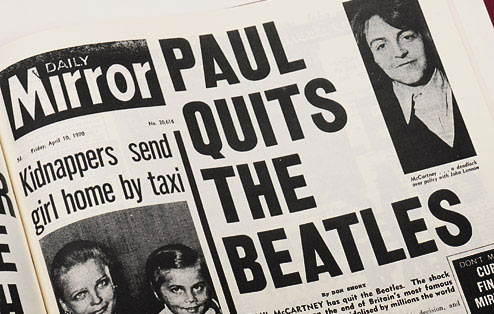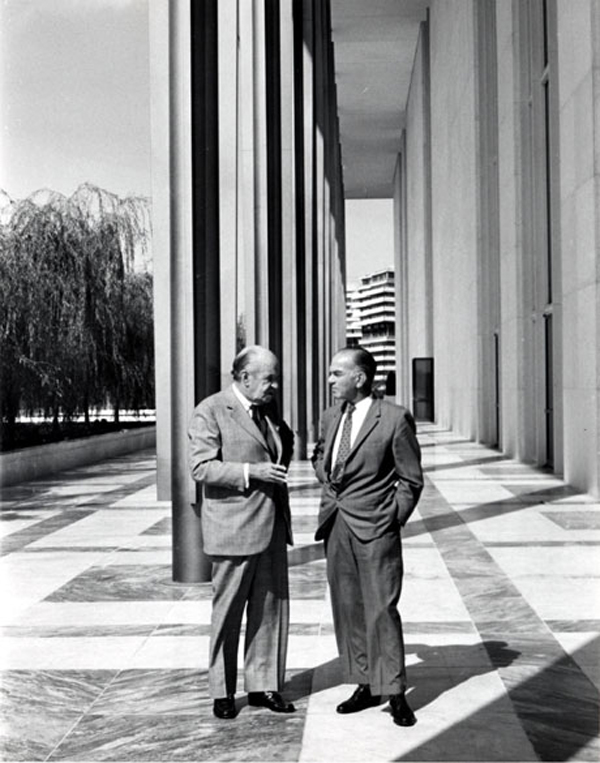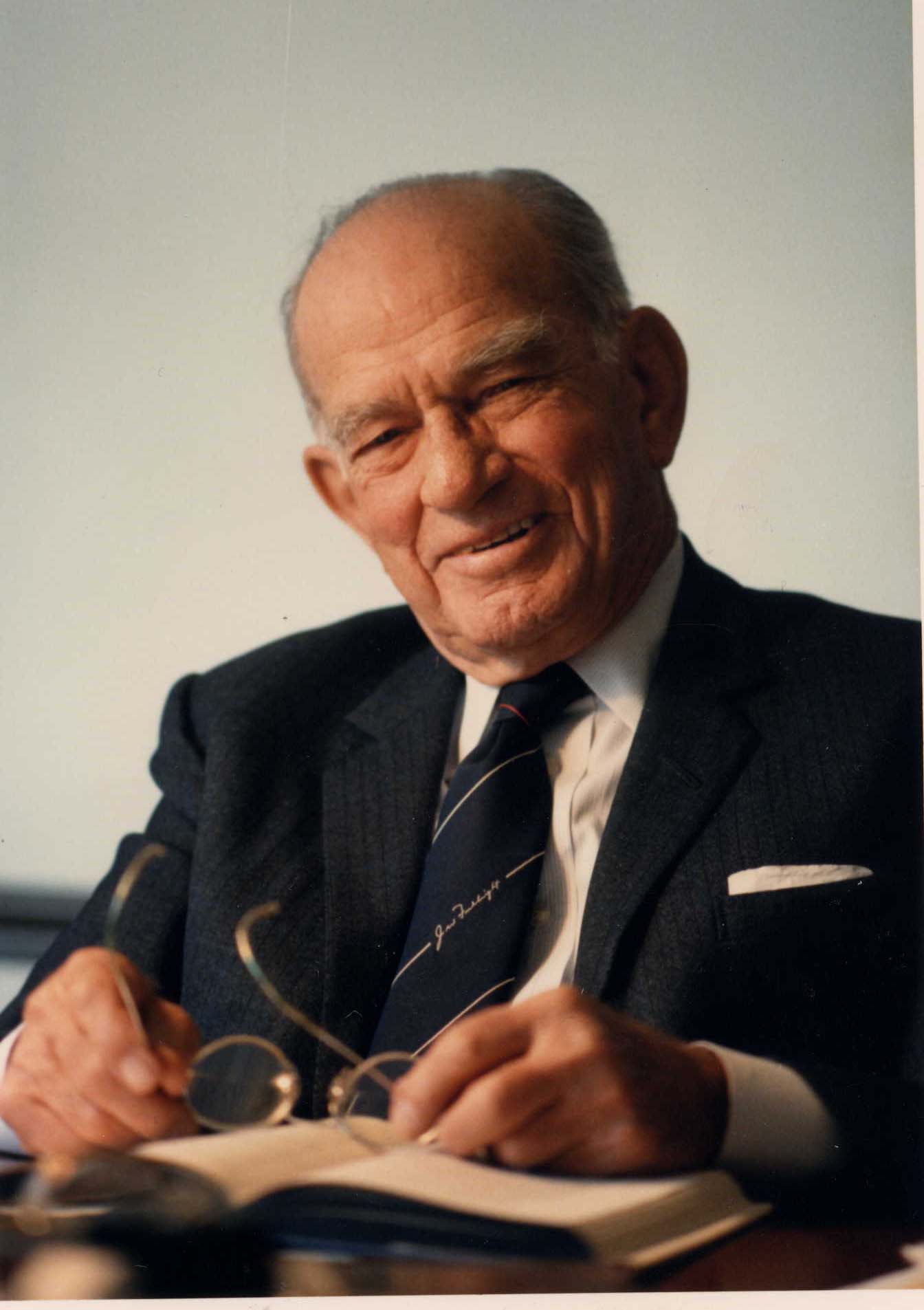The Senator's Music
from Essays
Tribute to Senator Fulbright
University of Arkansas
Wednesday, April 9
Fayatteville, AR
Good afternoon Fayetteville! Good afternoon Razorbacks!
Good afternoon to the world famous HogWild Band, here to raise some … helpful noise to celebrate the 109th birthday of Senator J. William Fulbright, who is trying to rest in peace a short walk from here in the Fayetteville cemetery.
Senator Fulbright was born on April 9th, 1905. And, though we’re here to sing his praises 109 years later, it’s worth noting that his birthday is actually a day some important music died.
April 9th was the break up of the Beatles.

And there was that Easter Sunday when two generals met in the parlor of the Wilmer McLean home in Appomattox, just three days shy of making four long years of bloodshed that had torn our country apart in civil war. Robert E. Lee surrendered on April 9th.
As the ink dried and two great men – one a mess and muddy, one starched, proper and pressed – stood solemnly and shook hands, a Union band started to play in celebration. But General Grant cut the music. He told his officers, “The war is over. The Rebels are our countrymen again.”
And then there was that international singing sensation, the contralto Marion Anderson, who was barred from singing in Constitution Hall because she was not white. But on April 9th, 1939, she did sing.

She sang “America the Beautiful” on the steps of the Lincoln Memorial and stirred a local crowd and a country listening on the radio to understand just what music can do, echoing out to them from among the pillars where Lincoln’s words are carved, "With malice toward none; with charity for all…let us strive on to finish the work we are in; to bind up the nation’s wounds.”
Senator Fulbright was 34 years old at the time. Do you know where he was? 1200 miles to the west, right here on this campus, serving as the youngest president of the University of Arkansas. I don’t know if he was listening to Marian Anderson that day. I don’t know what tune, if any, was in his heart.
But, of course, music never dies. It wasn’t only Marian Anderson who sang on April 9th. After all, Shaun Cassidy performed “Da Doo Ron Ron” on “American Bandstand.” Bob Dylan had his first gig in New York City that night. And in Dublin, a very different crowd on a very different April spring night, in a different century heard the premiere of Handel’s Messiah and its great Hallelujah chorus.
Senator Fulbright loved music. He wrote the legislation that created the Kennedy Center for the Performing Arts in Washington. And he made the law happen that created the Smithsonian Institution’s extraordinary program to record, document and rescue America’s fast-disappearing folk music tradition, including the great music of Arkansas and the Ozarks.
That was such a good idea that the musician and preacher Rev. Frederick Douglass Kirkpatrick, Jr. said Sen. Fulbright’s efforts was as important as “what fertilizer is to a turnip patch.”

Kirkpatrick’s praise was so eloquent, I just have to quote some more of it. He said of Fulbright’s support, "It put some humanity back in society, some love, some cooperation, which Dr. King so diligently did before he was killed … As a lover of humanity and a victim of an unrecognized culture I ask you to support this bill because everybody has a right to live.” Wow.
But why am I going so deep into fiddle country? I’ve been talking about music not because it was the only thing Sen. Fulbright cared about. Far from it. His hymn book went from art to technology, from poverty to peace, from history to the dangers of power. And it went from Fayetteville all across the globe. The famous scholarship program that bears his name has more than 300,000 alumni from all 50 states and almost 200 countries - creating peace and understanding in our fragile world for almost seven decades.

But the music of living is sometimes joyous, sometimes dark. Sometimes it stops. It is our responsibility to bring the music back, to keep it alive, to make it new – all of that and I’m talking whether you can sing or not. You certainly don’t want me to break into song.
Fulbright’s own story is about listening carefully to the music of living. Whatever he was doing on his birthday here that day at the University of Arkansas when Marian Anderson was singing America the Beautiful in 1935; whatever he was doing in 1963, when Martin Luther King, Jr. went back to those same steps of the Lincoln Memorial to tell us, “I have a dream that one day this nation will rise up and live out the true meaning of its creed: ‘We hold these truths to be self-evident, that all men are created equal,’” – Fulbright knew he himself needed to live by different music.
He was on the world stage, but he also cared about healing local wounds, finding inner peace. He said it was his great shame that his own segregationist past and opposition to civil right legislation hit so hard against the philosophy of the scholarship program he invented for the very purpose of respecting and understanding other people and living in peace with them.
Sometimes you simply need to go next door to hear the music. And he did. And that’s what Rev. Kirkpatrick, the Ozark singer and preacher was doing when he mentioned Dr. King and Senator Fulbright in praise in the same sentence. He made them neighbors.
Let us celebrate the great Senator J. William Fulbright for going next door, and for bringing the world next door to us–with its windows flung open and all its music, wild, beautiful, sad and crazy.

Happy Birthday, Senator Fulbright! Even with the HogWild Band about to play, may you rest in peace!